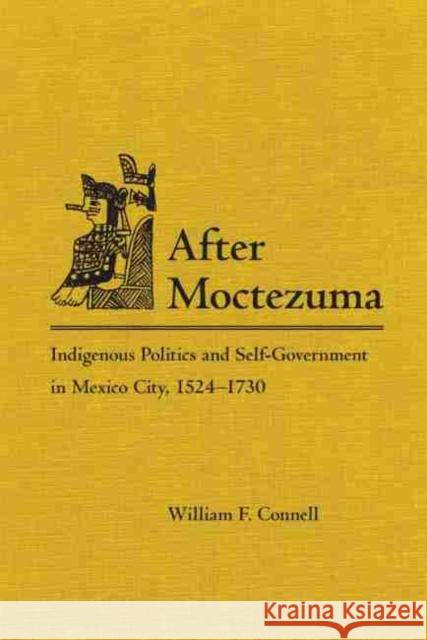After Moctezuma: Indigenous Politics and Self-Government in Mexico City, 1524-1730 » książka
After Moctezuma: Indigenous Politics and Self-Government in Mexico City, 1524-1730
ISBN-13: 9780806141756 / Angielski / Twarda / 2011 / 316 str.
After Moctezuma: Indigenous Politics and Self-Government in Mexico City, 1524-1730
ISBN-13: 9780806141756 / Angielski / Twarda / 2011 / 316 str.
(netto: 176,17 VAT: 5%)
Najniższa cena z 30 dni: 173,81
ok. 30 dni roboczych
Bez gwarancji dostawy przed świętami
Darmowa dostawa!
The Spanish invasion of Mexico in 1519 left the capital city, Tenochtitlan, in ruins. Conquistador Hernan Cortes, following the city's surrender in 1521, established a governing body to organize its reconstruction. Cortes was careful to appoint native people to govern who had held positions of authority before his arrival, establishing a pattern that endured for centuries. William F. Connell's "After Moctezuma: Indigenous Politics and Self-Government in Mexico City, 1524 1730" reveals how native self-government in former Tenochtitlan evolved over time as the city and its population changed.
Drawing on extensive research in Mexico's Archivo General de la Nacion, Connell shows how the hereditary political system of the Mexica was converted into a government by elected town councilmen, patterned after the Spanish "cabildo, " or municipal council. In the process, the Spanish relied upon existing Mexica administrative entities the native ethnic state, or "altepetl" of Mexico Tenochtitlan, became the" parcialidad" of San Juan Tenochtitlan, for instance preserving indigenous ideas of government within an imposed Spanish structure. Over time, the electoral system undermined the preconquest elite and introduced new native political players, facilitating social change. By the early eighteenth century, a process that had begun in the 1500s with the demise of Moctezuma and the royal line of Tenochtitlan had resulted in a politically independent indigenous cabildo.
"After Moctezuma" is the first systematic study of the indigenous political structures at the heart of New Spain. With careful attention to relations among colonial officials and indigenous power brokers, Connell shows that the ongoing contest for control of indigenous government in Mexico City made possible a new kind of political system neither wholly indigenous nor entirely Spanish. Ultimately, he offers insight into the political voice Tenochtitlan's indigenous people gained with the ability to choose their own leaders exercising power that endured through the end of the colonial period and beyond."











